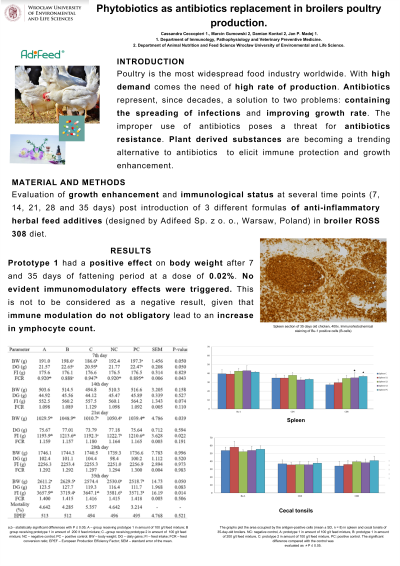Shaping the Future of Therapeutics
Poster Session A
(1054-A) Phytobiotics as antibiotics replacement in broilers poultry production.
Tuesday, May 28, 2024
16:30 - 17:15 CEST
Location: Exhibit Hall

- CC
Cassandra Ceccopieri, Msc
PhD student
Wroclaw University of Environmental and Life Sciences
Wroclaw, Dolnoslaskie, Poland
Poster Presenter(s)
Abstract:
Introduction: Precision medicine and personalized treatments and technologies certainly are the future of therapeutics. However, with the current detailed knowledge of the etiology of most pathologies, the key is prevention through a healthier lifestyle. Furthermore, let's not underestimate how Mother Nature can serve as a mine of important solutions. Major pharmaceutical industries are nowadays when antibiotic resistance has become a matter of global public concern, investing more and more in phytochemistry. In the case of poultry, the most widespread food industry worldwide, the improper use of antibiotics represents a threat not only for environmental contamination but also transmission to humans via consuming or handling tainted meat. Our study proposes a strategy that hits two marks: disease prevention through the production of a healthier food product and the application of phytochemistry.
Material and methods: We tested three prototypes of antioxidant herbal feed additives (accurately designed by Adifeed Sp. z o. o., Warsaw, Poland) for their ability to replace antibiotics for gain improvement and disease control.
Results: Evaluation at one month post administration showed, in a model of healthy broilers Ross 308 chickens, improved performance (body weight, daily gains, feed intake, feed conversion ratio, and European production efficiency factor) without triggering an immune response. The lymphocyte populations, measured with immunohistochemistry as a percentage of spleen and caecal tonsils areas positive for Bu-1, CD4, and CD8 (T-cytotoxic and natural killer) markers, confirmed no considerable signs of immune response activation in any of the experimental groups. On the contrary, the observed trend of reduced germinal center count in the spleen (representing B-cell response) may be the result of a healthier gut (e.g. fewer pathogens in the intestine) or induction of immune tolerance.
Discussion: Considering that generating inflammation antibiotics disrupt the intestinal microbiome (with serious consequences on general the health) improving the gain without triggering an immune response is a great achievement in the direction of more sustainable and safe food products.
Introduction: Precision medicine and personalized treatments and technologies certainly are the future of therapeutics. However, with the current detailed knowledge of the etiology of most pathologies, the key is prevention through a healthier lifestyle. Furthermore, let's not underestimate how Mother Nature can serve as a mine of important solutions. Major pharmaceutical industries are nowadays when antibiotic resistance has become a matter of global public concern, investing more and more in phytochemistry. In the case of poultry, the most widespread food industry worldwide, the improper use of antibiotics represents a threat not only for environmental contamination but also transmission to humans via consuming or handling tainted meat. Our study proposes a strategy that hits two marks: disease prevention through the production of a healthier food product and the application of phytochemistry.
Material and methods: We tested three prototypes of antioxidant herbal feed additives (accurately designed by Adifeed Sp. z o. o., Warsaw, Poland) for their ability to replace antibiotics for gain improvement and disease control.
Results: Evaluation at one month post administration showed, in a model of healthy broilers Ross 308 chickens, improved performance (body weight, daily gains, feed intake, feed conversion ratio, and European production efficiency factor) without triggering an immune response. The lymphocyte populations, measured with immunohistochemistry as a percentage of spleen and caecal tonsils areas positive for Bu-1, CD4, and CD8 (T-cytotoxic and natural killer) markers, confirmed no considerable signs of immune response activation in any of the experimental groups. On the contrary, the observed trend of reduced germinal center count in the spleen (representing B-cell response) may be the result of a healthier gut (e.g. fewer pathogens in the intestine) or induction of immune tolerance.
Discussion: Considering that generating inflammation antibiotics disrupt the intestinal microbiome (with serious consequences on general the health) improving the gain without triggering an immune response is a great achievement in the direction of more sustainable and safe food products.
